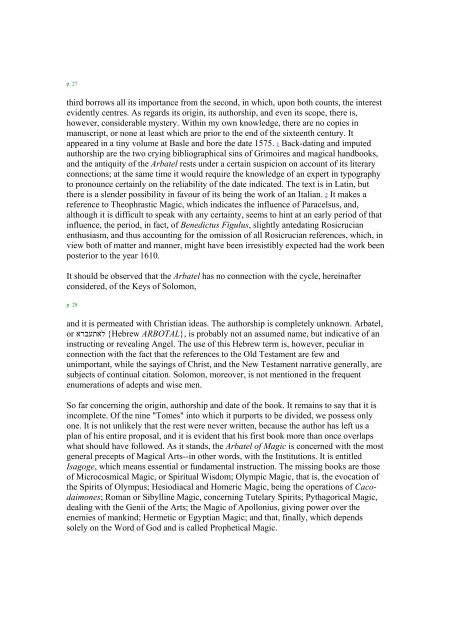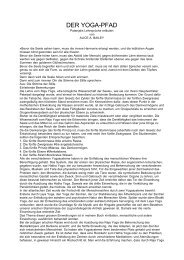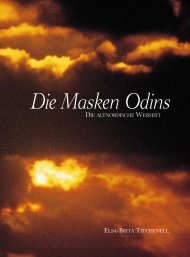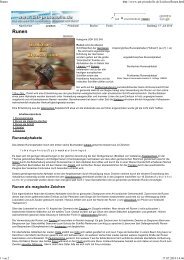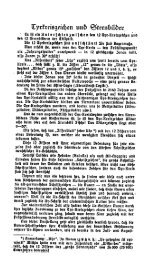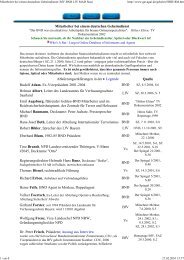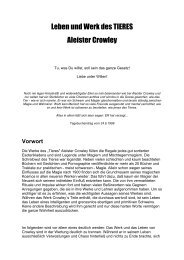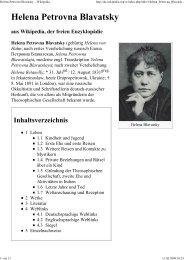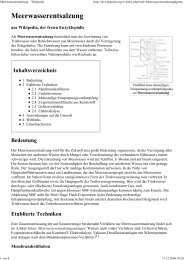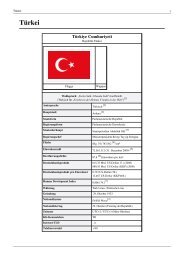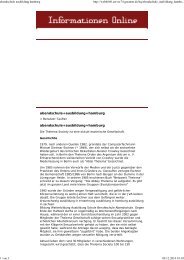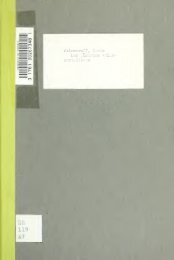The Book of ceremonial Magic
The Book of ceremonial Magic
The Book of ceremonial Magic
Create successful ePaper yourself
Turn your PDF publications into a flip-book with our unique Google optimized e-Paper software.
p. 27<br />
third borrows all its importance from the second, in which, upon both counts, the interest<br />
evidently centres. As regards its origin, its authorship, and even its scope, there is,<br />
however, considerable mystery. Within my own knowledge, there are no copies in<br />
manuscript, or none at least which are prior to the end <strong>of</strong> the sixteenth century. It<br />
appeared in a tiny volume at Basle and bore the date 1575. 1 Back-dating and imputed<br />
authorship are the two crying bibliographical sins <strong>of</strong> Grimoires and magical handbooks,<br />
and the antiquity <strong>of</strong> the Arbatel rests under a certain suspicion on account <strong>of</strong> its literary<br />
connections; at the same time it would require the knowledge <strong>of</strong> an expert in typography<br />
to pronounce certainly on the reliability <strong>of</strong> the date indicated. <strong>The</strong> text is in Latin, but<br />
there is a slender possibility in favour <strong>of</strong> its being the work <strong>of</strong> an Italian. 2 It makes a<br />
reference to <strong>The</strong>ophrastic <strong>Magic</strong>, which indicates the influence <strong>of</strong> Paracelsus, and,<br />
although it is difficult to speak with any certainty, seems to hint at an early period <strong>of</strong> that<br />
influence, the period, in fact, <strong>of</strong> Benedictus Figulus, slightly antedating Rosicrucian<br />
enthusiasm, and thus accounting for the omission <strong>of</strong> all Rosicrucian references, which, in<br />
view both <strong>of</strong> matter and manner, might have been irresistibly expected had the work been<br />
posterior to the year 1610.<br />
It should be observed that the Arbatel has no connection with the cycle, hereinafter<br />
considered, <strong>of</strong> the Keys <strong>of</strong> Solomon,<br />
p. 28<br />
and it is permeated with Christian ideas. <strong>The</strong> authorship is completely unknown. Arbatel,<br />
or לאתעברא {Hebrew ARBOTAL}, is probably not an assumed name, but indicative <strong>of</strong> an<br />
instructing or revealing Angel. <strong>The</strong> use <strong>of</strong> this Hebrew term is, however, peculiar in<br />
connection with the fact that the references to the Old Testament are few and<br />
unimportant, while the sayings <strong>of</strong> Christ, and the New Testament narrative generally, are<br />
subjects <strong>of</strong> continual citation. Solomon, moreover, is not mentioned in the frequent<br />
enumerations <strong>of</strong> adepts and wise men.<br />
So far concerning the origin, authorship and date <strong>of</strong> the book. It remains to say that it is<br />
incomplete. Of the nine "Tomes" into which it purports to be divided, we possess only<br />
one. It is not unlikely that the rest were never written, because the author has left us a<br />
plan <strong>of</strong> his entire proposal, and it is evident that his first book more than once overlaps<br />
what should have followed. As it stands, the Arbatel <strong>of</strong> <strong>Magic</strong> is concerned with the most<br />
general precepts <strong>of</strong> <strong>Magic</strong>al Arts--in other words, with the Institutions. It is entitled<br />
Isagoge, which means essential or fundamental instruction. <strong>The</strong> missing books are those<br />
<strong>of</strong> Microcosmical <strong>Magic</strong>, or Spiritual Wisdom; Olympic <strong>Magic</strong>, that is, the evocation <strong>of</strong><br />
the Spirits <strong>of</strong> Olympus; Hesiodiacal and Homeric <strong>Magic</strong>, being the operations <strong>of</strong> Cacodaimones;<br />
Roman or Sibylline <strong>Magic</strong>, concerning Tutelary Spirits; Pythagorical <strong>Magic</strong>,<br />
dealing with the Genii <strong>of</strong> the Arts; the <strong>Magic</strong> <strong>of</strong> Apollonius, giving power over the<br />
enemies <strong>of</strong> mankind; Hermetic or Egyptian <strong>Magic</strong>; and that, finally, which depends<br />
solely on the Word <strong>of</strong> God and is called Prophetical <strong>Magic</strong>.


